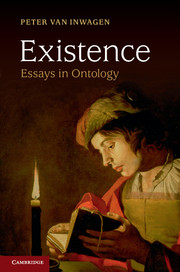Book contents
- Frontmatter
- Contents
- Preface
- Introduction: inside and outside the ontology room
- Chapter 1 Five questions
- Chapter 2 The new antimetaphysicians
- Chapter 3 Being, existence, and ontological commitment
- Chapter 4 Existence, ontological commitment, and fictional entities
- Chapter 5 Can variables be explained away?
- Chapter 6 Quine's 1946 lecture on nominalism
- Chapter 7 Alston on ontological commitment
- Chapter 8 A theory of properties
- Chapter 9 What is an ontological category?
- Chapter 10 Relational vs. constituent ontologies
- Chapter 11 Can mereological sums change their parts?
- Chapter 12 Causation and the mental
- Index
- References
Chapter 6 - Quine's 1946 lecture on nominalism
Published online by Cambridge University Press: 05 June 2014
- Frontmatter
- Contents
- Preface
- Introduction: inside and outside the ontology room
- Chapter 1 Five questions
- Chapter 2 The new antimetaphysicians
- Chapter 3 Being, existence, and ontological commitment
- Chapter 4 Existence, ontological commitment, and fictional entities
- Chapter 5 Can variables be explained away?
- Chapter 6 Quine's 1946 lecture on nominalism
- Chapter 7 Alston on ontological commitment
- Chapter 8 A theory of properties
- Chapter 9 What is an ontological category?
- Chapter 10 Relational vs. constituent ontologies
- Chapter 11 Can mereological sums change their parts?
- Chapter 12 Causation and the mental
- Index
- References
Summary
Quine has endorsed several closely related theses that I have referred to, collectively, as his “meta-ontology.” These are, roughly speaking, those of his theses that pertain to the topic “ontological commitment” or “ontic commitment.”
The locus classicus among Quine's early (that is, prior to the publication of Word and Object) statements of his meta-ontology is his 1948 essay ‘‘On What There Is.” Hilary Putnam has said of this essay, “[I was bowled over] when I read it as a first-year graduate student in 1948–49, and I think my reaction was not untypical.” Indeed his reaction was not untypical, at least if I may judge by my own reaction to the essay as a new graduate student twenty years later. Although I enjoyed and agreed with the first part of the essay (the “anti-Meinongian” part), it was the second part that bowled me over, the part that begins, “Now let us turn to the ontological problem of universals…” (p. 9). And what bowled me over was the ontological method on display in that part of the essay, not the particular things that Quine had to say about the problem of universals. (That is also the part, and the aspect, of the essay to which Putnam was describing his reaction.) But I think the 1946 lecture is a better presentation of Quine's meta-ontology than “On What There Is.” It would have been a good thing for the development of analytical ontology if Quine had written the lecture up and published it.
Information
- Type
- Chapter
- Information
- ExistenceEssays in Ontology, pp. 121 - 136Publisher: Cambridge University PressPrint publication year: 2014
